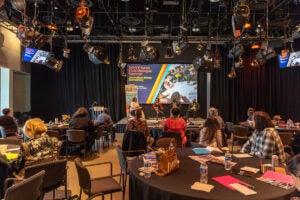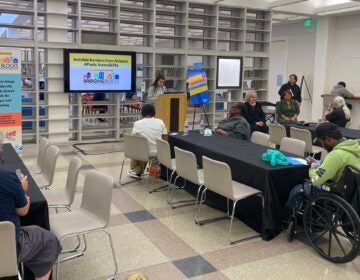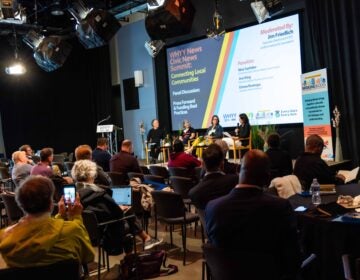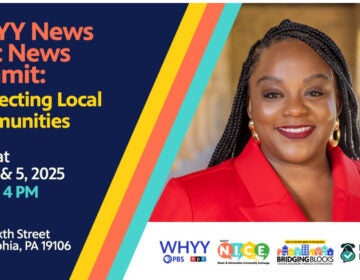Bridging Blocks has Philadelphians focused on dispelling myths around immigration
Context and understanding was at the heart of Bridging Blocks’ latest talk, which addressed border policy and immigration during an election year.
Listen 1:03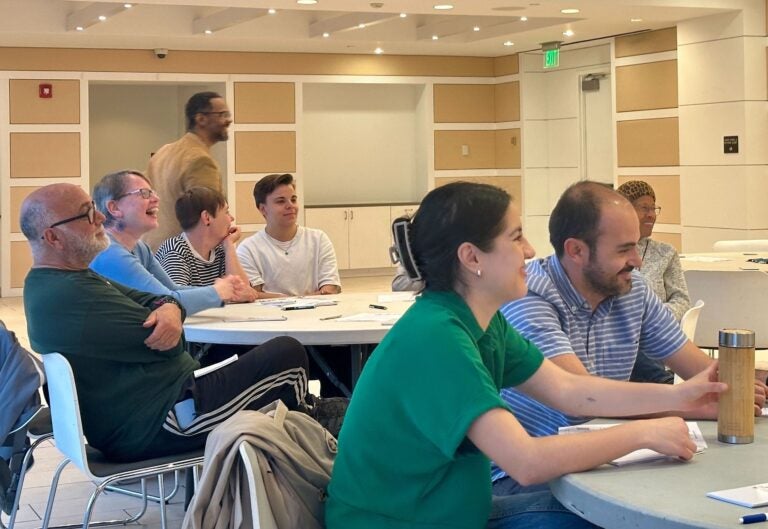
Many of Thursday's Bridging Blocks participants, such as Tania Bonilla, are immigrants who wanted to share their personal stories. (Vicky Diaz-Camacho/WHYY)
From Philly and the Pa. suburbs to South Jersey and Delaware, what would you like WHYY News to cover? Let us know!
One of the most divisive issues facing the U.S. currently is immigration policy.
At a WHYY Bridging Blocks discussion on Thursday, many attendees sought to dispel the belief that immigrants are bad for the country.
Tania Bonilla, a graduate student from Ecuador, said she dislikes the rhetoric being used by some conservatives.
“I don’t think that it’s an invasion,” Bonilla said.
Bonilla was among the roughly 30 community members who gathered at the Free Library of Philadelphia’s Center City location.
Debates over immigration and the laws that govern it go back to the early days when the U.S. was first formed.
Phillipe Weiss, director of legal services at the Hebrew Immigrant Aid Society, opened the event with a story about a longtime client, a 47-year-old mother of two from Honduras.
“For the last 24 years, she has lived a typical perhaps unremarkable life,” he said from the podium. “Her application with immigration had been issued a final approval and to give her her work permit. As I gave her this plastic document, the size of a driver’s license, she turned her head up, looked away from me. Holding back tears, she took a couple of deep breaths and said, ‘I am seen.’”
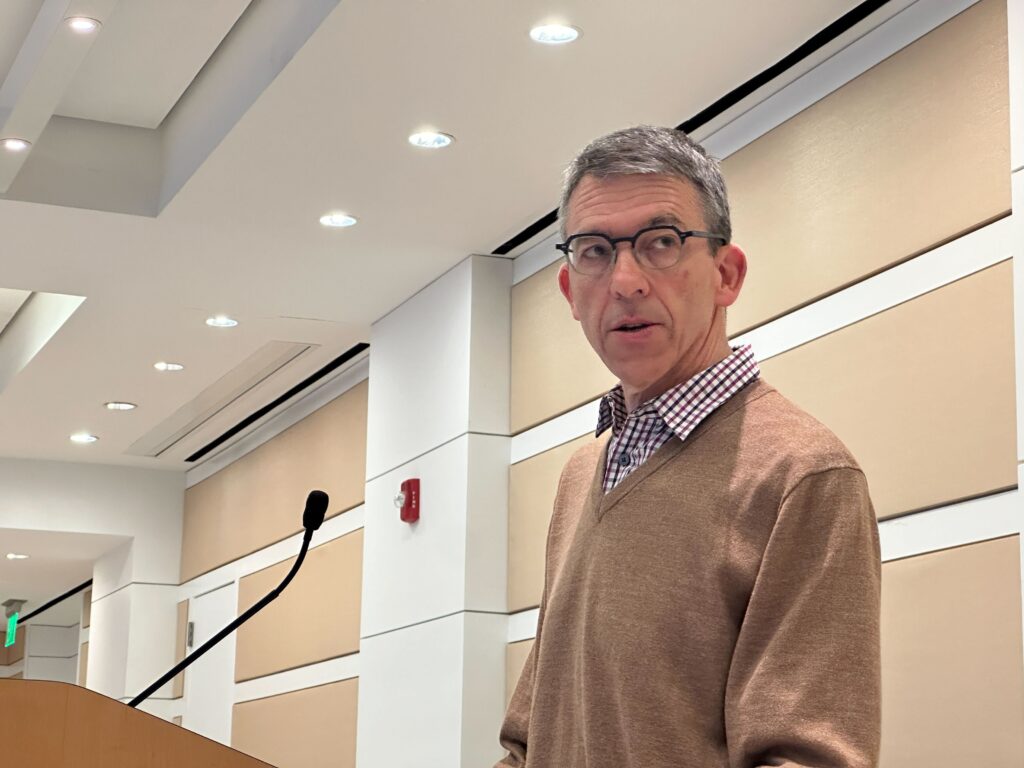
Several themes emerged during the event, such as immigration’s impacts on the U.S. workforce or the economy, and a confusing immigration system. Other topics included immigrant’s contributions to agriculture and the economy and the lesser-known risk with migrating and sex trafficking.
People are often desperate to get to the U.S. but become easy prey for “trusted traffickers” who exploit them because of their vulnerability, a participant said. That fractured sense of trust often extends to existing systems and the limited resources available.
“It’s kind of a perpetual struggle,” said Teodora Hasegan, who works for the Immigrant Refugee Wellness Academy. Hasegan is also an immigrant.
“Everything can be a challenge. Taking the bus, going to the store. Everything is different. So we can talk about the biggest challenge, like the legal systems or having a job or but there are daily, every day issues that it’s a challenge for them.”
The understanding and perception of immigration policy often splinters each time a new presidential administration is elected. Old laws are revised and new ones are proposed, blurring what protocol immigration officials should enforce or not.
At the center of raucous debates, the subject can be misunderstood, said Cathryn Miller-Wilson, executive director of the Hebrew Immigrant Aid Society, which sponsored the event.
“American immigration law is so complicated. We keep talking about, you know groups of people … and making assumptions about where they come from or why they came or what or what they need or what they take. All of that is because the individual’s voices are missing and because the actual legal facts about what they’re entitled to and not entitled to are missing,” Miller-Wilson said.
Her colleague Weiss used the example of denying undocumented immigrants an identification card.
“This is one of the great injustices of our current immigration laws, which purposefully robbed the most basic and fundamental dignity, the right to be called and recognized by our name,” he said. “Our immigration law strips the very identity of an estimated 12 million undocumented immigrants who live in the US and who are neighbors, co-workers and school friends of our children and grandchildren.”
On March 20, WHYY ”Studio 2” co-hosts Cherri Gregg and Avi Wolfman-Arent addressed the topic through the lens of immigrants powering the economic engine. One of their guests was an expert in immigration and economics, who himself immigrated to the states to study.
“The ‘villain argument’ is a lot of what we’re hearing in the political rhetoric, that immigrants take our jobs, that they undermine our jobs, they compromise our safety. But most of us haven’t imbibed a good counter argument to that,” said Exequiel Hernandez, author of the new book “The Truth About Immigration” and professor at the Wharton School at the University of Pennsylvania.
Before moving, Hernandez worried about how his own immigration would affect his new neighbors. He felt guilty, until he studied immigration patterns, investment patterns, entrepreneurship and corporate strategy.
“The truth about immigration is immigrants are net positive contributors to everything you want in your community to be prosperous,” he said. “That’s a fact, not just an opinion. The evidence shows that very clearly.”
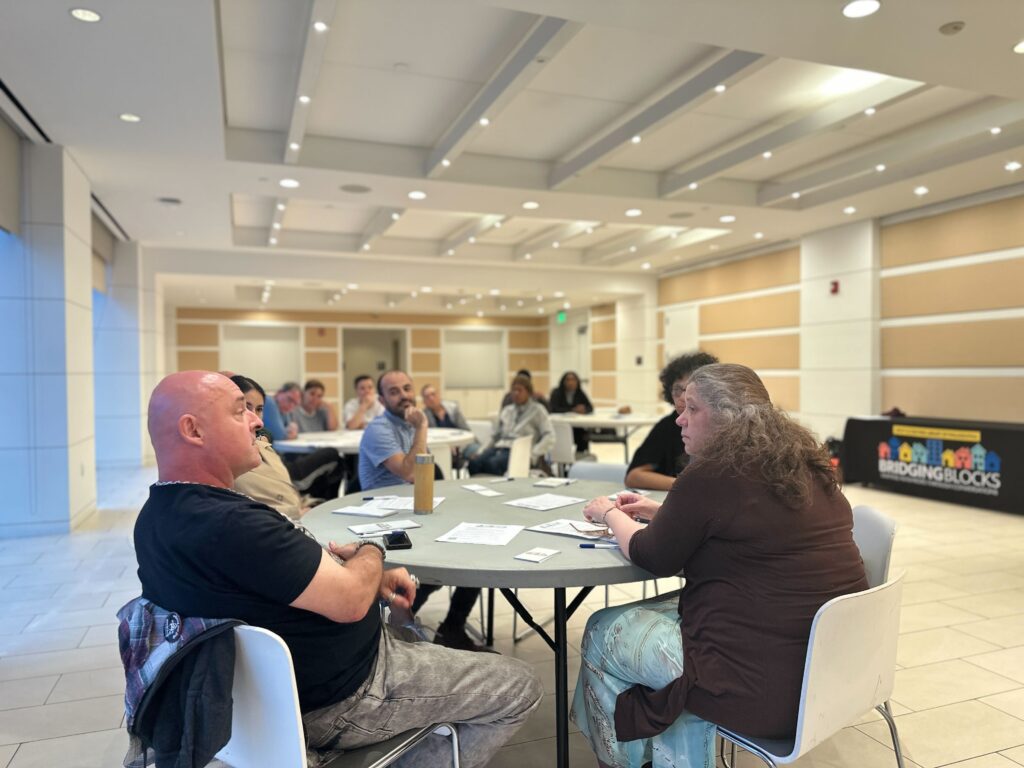
A common point of contention: the claim that immigrants “take jobs from native-born Americans.” Experts say the opposite is true.
Immigrant advocates like Hasegan say this narrative needs to be dispelled.
“I think that’s the main fear like oh these people are coming to take our resources. So it’s like this fear of losing out like this to some other people who don’t belong,” she said. “The view that should be shared with them is that immigrants are not the problem. They’re not a burden but an asset; they can be seen as an asset that could improve their own lives.”
Hasegan raised concerns over the lack of understanding and support for indigenous immigrant communities, like those in Colombia or other Spanish-speaking countries. When they arrive in the U.S., they face several layers of difficulty and trauma, she said. Their needs go overlooked.
The trickle-down effects are hurting not just immigrant adults, another participant said, but the children.
A former educator and first-generation Jamaican, Olivia, brought up issues with how government leaders decide to fund social programs and their impact on immigrant families and students.
She pointed to natural disasters that often displace communities who later immigrate to the U.S. with the hope of starting over. But starting from ground zero is hard, she said. Families face roadblocks or lack of aid, for example.
“Is there a hierarchy over which immigrant communities or refugee communities are prioritized when it comes to government funding?” Olivia said.
She said that growing up in New York, immigrants were integrated into society more readily than in Philadelphia. When she first moved to the city, she recalled thinking: “Where are the immigrants? Why are they hiding?”
For her, the visibility of more people from around the world is a good thing. It contributes to a sense of belonging.
Throughout the night, community members bonded over “hyphenated identities.” And some sought to underscore the community’s historical and present-day resilience.
“I get to know other people, other immigrants’ stories,” Hasegan said. “It’s not only about their challenges. What’s even more inspiring and empowering is how they are able to overcome.”
Editor’s note: The Hebrew Immigrant Aid Society was a partner in WHYY’s “Navigating Borders: Exploring the Issues of Immigration” Bridging Blocks event.
The next Bridging Blocks event is on April 18 at Walnut Street West Library.
Bridging Blocks is a WHYY and Free Library partnership fostering civil dialogue and understanding between diverse households. It is made possible thanks to the generous support of Fred and Barbara Sutherland.

Get daily updates from WHYY News!
WHYY is your source for fact-based, in-depth journalism and information. As a nonprofit organization, we rely on financial support from readers like you. Please give today.



